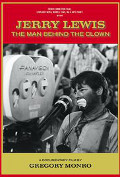
Directed by
Gregory Monro
61 minutes
Rated PG
Reviewed by
Chris Thompson

Jerry Lewis: The Man Behind the Clown
Synopsis: Since the beginning of his film career in the late 1940’s, Jerry Lewis has followed in the footsteps of the silent comedy icons like Charlie Chaplin, Buster Keaton and Stan Laurel, not just in the kinds of physical comedy he performed but also in his innovative approach to cinema. Beyond his visual gags, pantomime sketches and signature slapstick humor, Lewis was a ground-breaking filmmaker whose unquenchable curiosity led him to write, produce, stage and direct many of the films he appeared in, including comedy classics such as The Bellboy, The Ladies Man, The Errand Boy, and The Nutty Professor. By becoming a ‘total filmmaker’, Lewis rose above the limitations of being a comic performer and emerged as a driving force in Hollywood but, whilst his genius as an auteur was recognised internationally, American critics and the cultural elite tended to reject his vaudevillean style of art.What is it with the French New Wave of the Sixties and their inclination to find genius in the works of filmmakers that the American film establishment tended to dismiss as light entertainment? Earlier this year, we saw how Francois Truffaut helped redefine the world view of Alfred Hitchcock in Kent Jones’ Hitchcock/Truffaut and now comes Gregory Monro’s examination of the life and works of Jerry Lewis in which we see Truffaut contemporaries Jean Luc Goddard, Robert Benayoun and Louis Malle lauding the masterful skills and innovations of the comedian and filmmaker. But, as this very well made doco reveals, there are many more strings to Lewis’s bow – his highly successful partnership with Dean Martin, his respectable recording career, his tireless charity work and even as a contributor to the technical side of film-making (he developed the video-split camera system which allowed him to direct himself on set rather than wait 24 hours to view himself in the rushes).
There’s a strong Australian presence in this film that goes the beyond the involvement of co-producer Stephan Wellink and local cinematographer, Darrell Martin. Two of the key talking heads who reflect upon his influence on their careers are comedian and Lewis impersonator Tony Lewis and comedian and actor Shaun Micallef. Both, as you’d expect, are fans, but each has a different take on the importance of Lewis in the development of a certain kind of film comedy that comes from an era when such things went hand-in-hand with Vegas-style stage performances either live or captured for television. An impersonator like Tony Lewis (who, to look at, could be Jerry’s brother) keeps this style of performance alive and allows a contemporary audience to partake in something that is, in a small way, akin to Lewis in his heyday. (It’s also interesting to see, in the post credit sequence, that impersonating Jerry Lewis is not a new thing; the producers have unearthed some great old clips of other performers doing their Lewis shtick including the great Sammy Davis Junior).
Micallef, on the other hand, is less interested in mimicking Lewis than he is in embodying the spirt of that style of comedy and bringing it into the twenty-first century. He notes that for an awkward, klutzy teenager, Lewis was a kind of cockeyed role model. It’s also Micallef who makes the observation that, in one of Lewis’ films where he plays himself, the credits acknowledge that the part of Jerry Lewis is played by Joseph Levitch, Lewis’ real name. It’s an astute observation in a film that seeks to reveal the man behind the persona and one that is backed up by the man himself when we finally get to the end sequence in which Lewis, reclining on his couch in his Las Vegas home, speaks candidly about his career, his lifelong love affair with cinema and his frustrations with the way domestic critics never really understood him. He illustrates this point with the example of the almost universal acclaim he received for his role as Jerry Langford in Martin Scorsese’s The King of Comedy (1983) lamenting the fact that this newly admiring audience never recognised the acting craft that went into every one of his films.
Monro has managed to pack a lot into this hour-long doco. There’s a generous array of archival clips, a wide range of points of view from the talking heads and, of course, the bonus of having ninety-year-old Lewis himself address the camera. I must admit that, growing up, I had a love-hate relationship with Jerry Lewis films. I found them funny and infuriating in equal measure. But seeing this film with my eleven-year-old (who fell about laughing at the clips) confirmed the longevity of Lewis’ humour in much the same way as I feel about Chaplin, Keaton and the rest of those silent geniuses. This isn’t a doco that’s going to change the world but just might have changed the way I look at the masterful clown that is Jerry Lewis.

Want more about this film?


Want something different?




